Hexagramme 23 du Yi Jing - Trait 2
L'hexagramme : 23
Un hexagramme est une combinaison de six traits yin et yang.

23.2 (23 > 4) - THE PO HEXAGRAM
The second line, divided, shows one overthrowing the couch by injuring its frame. (The injury will go on to) the destruction of (all) firm correctness, and there will be evil.
Bing DeepL Google Yandex23.2 (23 > 4) - Poh, l’écroulement
Poh : opprimer, renverser, traiter durement.
[i]Id. (Poh)[i], renverser son lit en en brisant la forme ; ruine, issue destructive. C’est celui qui se perd lui-même en perdant ses auxiliaires ; un roi, ses ministres ; un grand, ses employés et amis. (Dicton.)
Il n’aura pas de compagnons.
C’est la ruine s’étendant, gagnant le haut.
23.2 (23 > 4) - Casser les pieds
Soutien que l'on ne peut pas user davantage.
Bing DeepL Google YandexLes trigrammes
Les trigrammes sont des combinaisons de trois traits yin et yang. Dans l'hexagramme, les trois traits du dessous constituent le trigramme inférieur et représentent la situation intérieure. Les trois lignes du haut constituent le trigramme supérieur et représentent la situation extérieure.
trigSup

Trigramme inférieur : La terre L'eau


L'hexagramme nucléaire : 2.1 (2 > 24)
L'hexagramme nucléaire est l'association des deux trigrammes intérieurs (traits 2,3,4 et 3,4,5). Il représente la racine, ou l'origine de la situation.
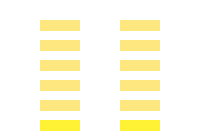
2.1 (2 > 24) - THE KHWĂN HEXAGRAM
In the first line, divided, (we see its subject) treading on hoarfrost. The strong ice will come (by and by).
Bing DeepL Google Yandex2.1 (2 > 24) - Kwūn, la réceptivité
Kwūn : a) Principe passif, réceptif. 1. Terre étendue et portant ; 2. Femme, femelle ; 3. Soumission, complaisance ; 4. Support, appui. — b) Kwun, fermer, lier. c) Kwun : vêtement impérial.
Quand on marche sur le verglas, c’est que la forte gelée arrive à son point extrême.
Cette phrase est une expression consacrée, peignant l’arrivée de l’hiver et le commencement des gelées. D’après la cosmologie chinoise, c’est le moment où le principe passif, réceptif, entre en action, commence à dominer et produit le fort hiver qui est son triomphe. — « Marcher sur le verglas » signifie aussi marcher avec prudence. — Le principe passif va ainsi du verglas à la glace. La forte gelée commençant par un fin verglas est aussi le type du principe producteur terrestre qui commence par l’atome pour produire les plus grands corps. Nous avons donc en cette phrase la plus forte expression du principe Kwūn, objet de la section.
Lorsque le principe passif commence la période de froid, suivant son cours naturel, il en vient aux fortes gelées.
Le dérivé (Fan Yao) : 4.2
Le même trait sur l'hexagramme après la mutation. Il représente ce qui peut être fait APRÈS pour corriger la situation décrite par ce trait, un peu comme un remède ou une solution.
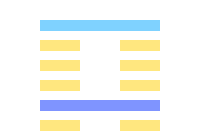
4.2 (4 > 23) - THE MĂNG HEXAGRAM
The second line, undivided, (shows its subject) exercising forbearance with the ignorant, in which there will be good fortune; and admitting (even the goodness of women, which will also be fortunate. (He may be described also as) a son able to (sustain the burden of) his family.
Bing DeepL Google Yandex4.2 (4 > 23) - Questioning
When someone is a welcoming and a patient teacher, they are trusted.
Bing DeepL Google Yandex4.2 (4 > 23) - Questioning
When someone is welcoming and a patient teacher, they are trusted.
Bing DeepL Google Yandex4.2 (4 > 23) - Meng, la stupidité juvénile
Meng : Intelligence non encore développée ; être non encore formé.
Il est bien de se préoccuper de l’ignorant et de soutenir la jeune fille. Ainsi, ils pourront triompher de leur ignorance.
L’enfant fait durer la famille ; il faut en avoir soin.
Le fort et le faible doivent s’entraider.
4.2 (4 > 23) - Interroger
Quand on est accueillant et que l'on a la patience d'enseigner, on nous fait confiance.
Bing DeepL Google Yandex4.2 (4 > 23) - Tanácskérés
Ha valaki barátságos és bizalmas tanár, bíznak benne.
Bing DeepL Google YandexLa jointure: 3.5
Le dérivé du réciproque. Il représente ce qui aurait pu être fait AVANT pour prévenir la situation décrite par ce trait, un peu comme un remède ou une solution.
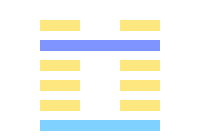
3.5 (3 > 24) - THE KUN HEXAGRAM
The fifth line, undivided, shows the difficulties in the way of (its subject's) dispensing the rich favours that might be expected from him. With firmness and correctness there will be good fortune in small things; (even) with them in great things there will be evil.
Bing DeepL Google Yandex3.5 (3 > 24) - Questioning the commitment of others
One wants to know before deciding.
Bing DeepL Google Yandex3.5 (3 > 24) - Questioning the commitment of others
One wants to know before deciding.
Bing DeepL Google Yandex3.5 (3 > 24) - T’un, la difficulté initiale
T’un et tchun : A. 1. Bourgeon, pousse ; 2. Croissance, activité ; 3. Grandir, avancer. — B. Difficultés, arrêté dans son avancement, échec.
Dans le développement de la sève des bourgeons, si elle se répand modérément, la croissance sera heureuse ; si elle se répand trop, le croissance sera empêchée.
Il en est ainsi si elle se répand avant d’être suffisamment riche et forte.
Obstacle au développement : s’il est petit, l’issue peut être heureuse ; s’il est grand, fin malheureuse.
3.5 (3 > 24) - Remettre en question l'engagement des autres
On veut savoir avant de décider.
Bing DeepL Google YandexLe réciproque : 24.5
L'hexagramme renversé. Il représente la situation opposée, et en tant que tel est essentiel pour la validation des commentaires.
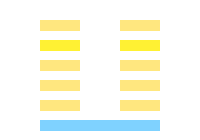
24.5 (24 > 3) - THE FÛ HEXAGRAM.
The fifth line, divided, shows the noble return of its subject. There will be no ground for repentance.
Bing DeepL Google Yandex24.5 (24 > 3) - Recognising one's faults
One has the courage to admit having made a mistake.
Bing DeepL Google Yandex24.5 (24 > 3) - Recognizing one's faults
One has the courage to admit having made a mistake.
Bing DeepL Google Yandex24.5 (24 > 3) - Fû, le retour
Fū : réparation, correction, amendement, retour à l’état originaire
L’amendement généreux est sans regret ; il se règle selon le juste milieu.
Bing DeepL Google Yandex24.5 (24 > 3) - Reconnaître ses fautes
On a le courage d'admettre qu'on s'est trompé.
Bing DeepL Google YandexMutations

23.2 (23 > 4) - THE PO HEXAGRAM
The second line, divided, shows one overthrowing the couch by injuring its frame. (The injury will go on to) the destruction of (all) firm correctness, and there will be evil.
Bing DeepL Google Yandex23.2 (23 > 4) - Poh, l’écroulement
Poh : opprimer, renverser, traiter durement.
[i]Id. (Poh)[i], renverser son lit en en brisant la forme ; ruine, issue destructive. C’est celui qui se perd lui-même en perdant ses auxiliaires ; un roi, ses ministres ; un grand, ses employés et amis. (Dicton.)
Il n’aura pas de compagnons.
C’est la ruine s’étendant, gagnant le haut.
23.2 (23 > 4) - Casser les pieds
Soutien que l'on ne peut pas user davantage.
Bing DeepL Google Yandex
23.1.2 (23 > 41) - THE PO HEXAGRAM
- 1. The first line, divided, shows one overturning the couch by injuring its legs. (The injury will go on to) the destruction of (all) firm correctness, and there will be evil.
- 2. The second line, divided, shows one overthrowing the couch by injuring its frame. (The injury will go on to) the destruction of (all) firm correctness, and there will be evil.
23.1.2 (23 > 41) - Sobering up
One admits that it was wrong to put oneself in such a state.
Bing DeepL Google Yandex23.1.2 (23 > 41) - Sobering up
One admits that it was wrong to put oneself in such a state.
Bing DeepL Google Yandex23.1.2 (23 > 41) - Poh, l’écroulement
Poh : opprimer, renverser, traiter durement.
-
1. Poh, « renverser, faire crouler » son lit en en brisant un pied et le détachant ainsi (suites funestes).
C’est le grand, le prince qui se nuit à lui-même en appauvrissant, affaiblissant son peuple. -
2. [i]Id. (Poh)[i], renverser son lit en en brisant la forme ; ruine, issue destructive. C’est celui qui se perd lui-même en perdant ses auxiliaires ; un roi, ses ministres ; un grand, ses employés et amis. (Dicton.)
Il n’aura pas de compagnons.
C’est la ruine s’étendant, gagnant le haut.
23.1.2 (23 > 41) - Se dégriser
On admet avoir eu tort de se mettre dans un état pareil.
Bing DeepL Google Yandex23.1.2 (23 > 41) - Lepusztulás
- 1. Nem látja mit veszít.
- 2. Támasz, amire nem lehet számítani többé.

23.2.3 (23 > 18) - THE PO HEXAGRAM
- 2. The second line, divided, shows one overthrowing the couch by injuring its frame. (The injury will go on to) the destruction of (all) firm correctness, and there will be evil.
- 3. The third line, divided, shows its subject among the overthrowers; but there will be no error.
23.2.3 (23 > 18) - Evacuating the premises
One is repatriating one's assistants so they won't be in trouble.
Bing DeepL Google Yandex23.2.3 (23 > 18) - Evacuating the premises
One is repatriating one's assistants so they won't be in trouble.
Bing DeepL Google Yandex23.2.3 (23 > 18) - Poh, l’écroulement
Poh : opprimer, renverser, traiter durement.
-
2. [i]Id. (Poh)[i], renverser son lit en en brisant la forme ; ruine, issue destructive. C’est celui qui se perd lui-même en perdant ses auxiliaires ; un roi, ses ministres ; un grand, ses employés et amis. (Dicton.)
Il n’aura pas de compagnons.
C’est la ruine s’étendant, gagnant le haut. - 3. Renverser, faire crouler quelque chose sans suite regrettable. C’est quand on le fait légitimement et pour bonnes raisons. C’est que cela atteint également grands et petits (ou abandonne).
23.2.3 (23 > 18) - Évacuer les lieux
On rapatrie ses assistants pour qu'ils ne soient pas mis en difficulté.
Bing DeepL Google Yandex23.2.3 (23 > 18) - Lepusztulás
- 2. Támasz, amire nem lehet számítani többé.
- 3. Nem törődik a többiekkel többé.

23.1.2.3 (23 > 26) - THE PO HEXAGRAM
- 1. The first line, divided, shows one overturning the couch by injuring its legs. (The injury will go on to) the destruction of (all) firm correctness, and there will be evil.
- 2. The second line, divided, shows one overthrowing the couch by injuring its frame. (The injury will go on to) the destruction of (all) firm correctness, and there will be evil.
- 3. The third line, divided, shows its subject among the overthrowers; but there will be no error.
23.1.2.3 (23 > 26) - Asking for more
One is calling for more resources to succeed in one's business.
Bing DeepL Google Yandex23.1.2.3 (23 > 26) - Asking for more
One is calling for more resources to succeed in one's business.
Bing DeepL Google Yandex23.1.2.3 (23 > 26) - Poh, l’écroulement
Poh : opprimer, renverser, traiter durement.
-
1. Poh, « renverser, faire crouler » son lit en en brisant un pied et le détachant ainsi (suites funestes).
C’est le grand, le prince qui se nuit à lui-même en appauvrissant, affaiblissant son peuple. -
2. [i]Id. (Poh)[i], renverser son lit en en brisant la forme ; ruine, issue destructive. C’est celui qui se perd lui-même en perdant ses auxiliaires ; un roi, ses ministres ; un grand, ses employés et amis. (Dicton.)
Il n’aura pas de compagnons.
C’est la ruine s’étendant, gagnant le haut. - 3. Renverser, faire crouler quelque chose sans suite regrettable. C’est quand on le fait légitimement et pour bonnes raisons. C’est que cela atteint également grands et petits (ou abandonne).
23.1.2.3 (23 > 26) - Demander une rallonge
On réclame plus de moyens pour réussir son entreprise.
Bing DeepL Google Yandex23.1.2.3 (23 > 26) - Lepusztulás
- 1. Nem látja mit veszít.
- 2. Támasz, amire nem lehet számítani többé.
- 3. Nem törődik a többiekkel többé.
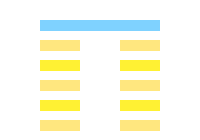
23.2.4 (23 > 64) - THE PO HEXAGRAM
- 2. The second line, divided, shows one overthrowing the couch by injuring its frame. (The injury will go on to) the destruction of (all) firm correctness, and there will be evil.
- 4. The fourth line, divided, shows its subject having overthrown the couch, and (going to injure) the skin (of him who lies on it). There will be evil.
23.2.4 (23 > 64) - Preparing patches
One is bolstering an old piece of debris to send it to the front.
Bing DeepL Google Yandex23.2.4 (23 > 64) - Preparing patches
One is bolstering an old piece of debris to send it to the front.
Bing DeepL Google Yandex23.2.4 (23 > 64) - Poh, l’écroulement
Poh : opprimer, renverser, traiter durement.
-
2. [i]Id. (Poh)[i], renverser son lit en en brisant la forme ; ruine, issue destructive. C’est celui qui se perd lui-même en perdant ses auxiliaires ; un roi, ses ministres ; un grand, ses employés et amis. (Dicton.)
Il n’aura pas de compagnons.
C’est la ruine s’étendant, gagnant le haut. -
4. Renverser son lit en s’écorchant, en se nuisant à soi-même, destruction certaine, calamité proche.
Suite de la gradation, en renversant on se blesse
23.2.4 (23 > 64) - Préparer des rustines
On rafistole un vieux débris pour l'envoyer au front.
Bing DeepL Google Yandex23.2.4 (23 > 64) - Lepusztulás
- 2. Támasz, amire nem lehet számítani többé.
- 4. Nem akar elviselni többé.
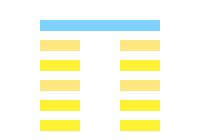
23.1.2.4 (23 > 38) - THE PO HEXAGRAM
- 1. The first line, divided, shows one overturning the couch by injuring its legs. (The injury will go on to) the destruction of (all) firm correctness, and there will be evil.
- 2. The second line, divided, shows one overthrowing the couch by injuring its frame. (The injury will go on to) the destruction of (all) firm correctness, and there will be evil.
- 4. The fourth line, divided, shows its subject having overthrown the couch, and (going to injure) the skin (of him who lies on it). There will be evil.
23.1.2.4 (23 > 38) - Feeling better
One finally understands the message that others have tried to convey.
Bing DeepL Google Yandex23.1.2.4 (23 > 38) - Feeling better
One finally understands the message that others have tried to convey.
Bing DeepL Google Yandex23.1.2.4 (23 > 38) - Poh, l’écroulement
Poh : opprimer, renverser, traiter durement.
-
1. Poh, « renverser, faire crouler » son lit en en brisant un pied et le détachant ainsi (suites funestes).
C’est le grand, le prince qui se nuit à lui-même en appauvrissant, affaiblissant son peuple. -
2. [i]Id. (Poh)[i], renverser son lit en en brisant la forme ; ruine, issue destructive. C’est celui qui se perd lui-même en perdant ses auxiliaires ; un roi, ses ministres ; un grand, ses employés et amis. (Dicton.)
Il n’aura pas de compagnons.
C’est la ruine s’étendant, gagnant le haut. -
4. Renverser son lit en s’écorchant, en se nuisant à soi-même, destruction certaine, calamité proche.
Suite de la gradation, en renversant on se blesse
23.1.2.4 (23 > 38) - Reprendre des couleurs
On finit par comprendre le message que les autres ont voulu faire passer.
Bing DeepL Google Yandex23.1.2.4 (23 > 38) - Lepusztulás
- 1. Nem látja mit veszít.
- 2. Támasz, amire nem lehet számítani többé.
- 4. Nem akar elviselni többé.

23.2.3.4 (23 > 50) - THE PO HEXAGRAM
- 2. The second line, divided, shows one overthrowing the couch by injuring its frame. (The injury will go on to) the destruction of (all) firm correctness, and there will be evil.
- 3. The third line, divided, shows its subject among the overthrowers; but there will be no error.
- 4. The fourth line, divided, shows its subject having overthrown the couch, and (going to injure) the skin (of him who lies on it). There will be evil.
23.2.3.4 (23 > 50) - Not willing to jeopardise a budding love
One prefers not to tell others the real reasons for their fall from grace.
Bing DeepL Google Yandex23.2.3.4 (23 > 50) - Not willing to jeopardize a budding love
One prefers not to tell others the real reasons for their fall from grace.
Bing DeepL Google Yandex23.2.3.4 (23 > 50) - Poh, l’écroulement
Poh : opprimer, renverser, traiter durement.
-
2. [i]Id. (Poh)[i], renverser son lit en en brisant la forme ; ruine, issue destructive. C’est celui qui se perd lui-même en perdant ses auxiliaires ; un roi, ses ministres ; un grand, ses employés et amis. (Dicton.)
Il n’aura pas de compagnons.
C’est la ruine s’étendant, gagnant le haut. - 3. Renverser, faire crouler quelque chose sans suite regrettable. C’est quand on le fait légitimement et pour bonnes raisons. C’est que cela atteint également grands et petits (ou abandonne).
-
4. Renverser son lit en s’écorchant, en se nuisant à soi-même, destruction certaine, calamité proche.
Suite de la gradation, en renversant on se blesse
23.2.3.4 (23 > 50) - Ne pas vouloir compromettre un amour naissant
On préfère ne pas dire aux autres les vraies raisons de leur déchéance.
Bing DeepL Google Yandex23.2.3.4 (23 > 50) - Lepusztulás
- 2. Támasz, amire nem lehet számítani többé.
- 3. Nem törődik a többiekkel többé.
- 4. Nem akar elviselni többé.

23.1.2.3.4 (23 > 14) - THE PO HEXAGRAM
- 1. The first line, divided, shows one overturning the couch by injuring its legs. (The injury will go on to) the destruction of (all) firm correctness, and there will be evil.
- 2. The second line, divided, shows one overthrowing the couch by injuring its frame. (The injury will go on to) the destruction of (all) firm correctness, and there will be evil.
- 3. The third line, divided, shows its subject among the overthrowers; but there will be no error.
- 4. The fourth line, divided, shows its subject having overthrown the couch, and (going to injure) the skin (of him who lies on it). There will be evil.
23.1.2.3.4 (23 > 14) - Showing up
One is moving forward a little further so as not to disappoint those who receive.
Bing DeepL Google Yandex23.1.2.3.4 (23 > 14) - Showing up
One is moving forward a little further so as not to disappoint those who receive.
Bing DeepL Google Yandex23.1.2.3.4 (23 > 14) - Poh, l’écroulement
Poh : opprimer, renverser, traiter durement.
-
1. Poh, « renverser, faire crouler » son lit en en brisant un pied et le détachant ainsi (suites funestes).
C’est le grand, le prince qui se nuit à lui-même en appauvrissant, affaiblissant son peuple. -
2. [i]Id. (Poh)[i], renverser son lit en en brisant la forme ; ruine, issue destructive. C’est celui qui se perd lui-même en perdant ses auxiliaires ; un roi, ses ministres ; un grand, ses employés et amis. (Dicton.)
Il n’aura pas de compagnons.
C’est la ruine s’étendant, gagnant le haut. - 3. Renverser, faire crouler quelque chose sans suite regrettable. C’est quand on le fait légitimement et pour bonnes raisons. C’est que cela atteint également grands et petits (ou abandonne).
-
4. Renverser son lit en s’écorchant, en se nuisant à soi-même, destruction certaine, calamité proche.
Suite de la gradation, en renversant on se blesse
23.1.2.3.4 (23 > 14) - Faire acte de présence
On avance encore un peu pour ne pas décevoir ceux qui reçoivent.
Bing DeepL Google Yandex23.1.2.3.4 (23 > 14) - Lepusztulás
- 1. Nem látja mit veszít.
- 2. Támasz, amire nem lehet számítani többé.
- 3. Nem törődik a többiekkel többé.
- 4. Nem akar elviselni többé.
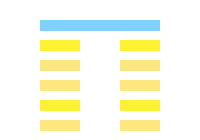
23.2.5 (23 > 59) - THE PO HEXAGRAM
- 2. The second line, divided, shows one overthrowing the couch by injuring its frame. (The injury will go on to) the destruction of (all) firm correctness, and there will be evil.
- 5. The fifth line, divided, shows (its subject leading on the others like) a string of fishes, and (obtaining for them) the favour that lights on the inmates of the palace. There will be advantage in every way.
23.2.5 (23 > 59) - Losing one's guideline
One notices the reflux of the ideas that one cherished the most.
Bing DeepL Google Yandex23.2.5 (23 > 59) - Losing one's guideline
One notices the reflux of the ideas that one cherished the most.
Bing DeepL Google Yandex23.2.5 (23 > 59) - Poh, l’écroulement
Poh : opprimer, renverser, traiter durement.
-
2. [i]Id. (Poh)[i], renverser son lit en en brisant la forme ; ruine, issue destructive. C’est celui qui se perd lui-même en perdant ses auxiliaires ; un roi, ses ministres ; un grand, ses employés et amis. (Dicton.)
Il n’aura pas de compagnons.
C’est la ruine s’étendant, gagnant le haut. -
5. Le prince généreux envers les gens du palais (litt.(/i] : qui enfile des poissons pour en faire présent), en retirera des avantages certains.
Peut-être devrait-on admettre déjà ici l’élément figuratif et symbolique, et voir dans l’hexagramme la figure du prince (ligne pleine supérieure) au-dessus de ses officiers rangés comme des poissons séchés et traduire : avoir des officiers comme des poissons enfilés. Alors, il s’agirait de [i]p’o, gens du palais.
23.2.5 (23 > 59) - Perdre sa ligne directrice
On constate le reflux des idées auxquelles on tenait le plus.
Bing DeepL Google Yandex23.2.5 (23 > 59) - Lepusztulás
- 2. Támasz, amire nem lehet számítani többé.
- 5. Látja mi nem működik.
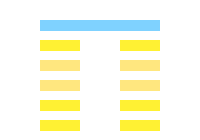
23.1.2.5 (23 > 61) - THE PO HEXAGRAM
- 1. The first line, divided, shows one overturning the couch by injuring its legs. (The injury will go on to) the destruction of (all) firm correctness, and there will be evil.
- 2. The second line, divided, shows one overthrowing the couch by injuring its frame. (The injury will go on to) the destruction of (all) firm correctness, and there will be evil.
- 5. The fifth line, divided, shows (its subject leading on the others like) a string of fishes, and (obtaining for them) the favour that lights on the inmates of the palace. There will be advantage in every way.
23.1.2.5 (23 > 61) - Wanting to see only the bright side
One refuses to hear embarrassing confidences.
Bing DeepL Google Yandex23.1.2.5 (23 > 61) - Wanting to see only the bright side
One refuses to hear embarrassing confidences.
Bing DeepL Google Yandex23.1.2.5 (23 > 61) - Poh, l’écroulement
Poh : opprimer, renverser, traiter durement.
-
1. Poh, « renverser, faire crouler » son lit en en brisant un pied et le détachant ainsi (suites funestes).
C’est le grand, le prince qui se nuit à lui-même en appauvrissant, affaiblissant son peuple. -
2. [i]Id. (Poh)[i], renverser son lit en en brisant la forme ; ruine, issue destructive. C’est celui qui se perd lui-même en perdant ses auxiliaires ; un roi, ses ministres ; un grand, ses employés et amis. (Dicton.)
Il n’aura pas de compagnons.
C’est la ruine s’étendant, gagnant le haut. -
5. Le prince généreux envers les gens du palais (litt.(/i] : qui enfile des poissons pour en faire présent), en retirera des avantages certains.
Peut-être devrait-on admettre déjà ici l’élément figuratif et symbolique, et voir dans l’hexagramme la figure du prince (ligne pleine supérieure) au-dessus de ses officiers rangés comme des poissons séchés et traduire : avoir des officiers comme des poissons enfilés. Alors, il s’agirait de [i]p’o, gens du palais.
23.1.2.5 (23 > 61) - Ne vouloir voir que le bon côté
On refuse d'entendre des confidences embarrassantes.
Bing DeepL Google Yandex23.1.2.5 (23 > 61) - Lepusztulás
- 1. Nem látja mit veszít.
- 2. Támasz, amire nem lehet számítani többé.
- 5. Látja mi nem működik.
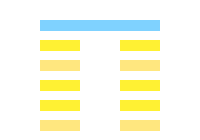
23.2.3.5 (23 > 57) - THE PO HEXAGRAM
- 2. The second line, divided, shows one overthrowing the couch by injuring its frame. (The injury will go on to) the destruction of (all) firm correctness, and there will be evil.
- 3. The third line, divided, shows its subject among the overthrowers; but there will be no error.
- 5. The fifth line, divided, shows (its subject leading on the others like) a string of fishes, and (obtaining for them) the favour that lights on the inmates of the palace. There will be advantage in every way.
23.2.3.5 (23 > 57) - Fleeing the palaver tree
One yearns for more tranquility so one doesn't answer anymore.
Bing DeepL Google Yandex23.2.3.5 (23 > 57) - Fleeing the palaver tree
One yearns for more tranquility so one doesn't answer anymore.
Bing DeepL Google Yandex23.2.3.5 (23 > 57) - Poh, l’écroulement
Poh : opprimer, renverser, traiter durement.
-
2. [i]Id. (Poh)[i], renverser son lit en en brisant la forme ; ruine, issue destructive. C’est celui qui se perd lui-même en perdant ses auxiliaires ; un roi, ses ministres ; un grand, ses employés et amis. (Dicton.)
Il n’aura pas de compagnons.
C’est la ruine s’étendant, gagnant le haut. - 3. Renverser, faire crouler quelque chose sans suite regrettable. C’est quand on le fait légitimement et pour bonnes raisons. C’est que cela atteint également grands et petits (ou abandonne).
-
5. Le prince généreux envers les gens du palais (litt.(/i] : qui enfile des poissons pour en faire présent), en retirera des avantages certains.
Peut-être devrait-on admettre déjà ici l’élément figuratif et symbolique, et voir dans l’hexagramme la figure du prince (ligne pleine supérieure) au-dessus de ses officiers rangés comme des poissons séchés et traduire : avoir des officiers comme des poissons enfilés. Alors, il s’agirait de [i]p’o, gens du palais.
23.2.3.5 (23 > 57) - Fuir l'arbre à palabres
On aspire à plus de tranquillité alors on ne répond plus.
Bing DeepL Google Yandex23.2.3.5 (23 > 57) - Lepusztulás
- 2. Támasz, amire nem lehet számítani többé.
- 3. Nem törődik a többiekkel többé.
- 5. Látja mi nem működik.
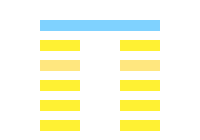
23.1.2.3.5 (23 > 9) - THE PO HEXAGRAM
- 1. The first line, divided, shows one overturning the couch by injuring its legs. (The injury will go on to) the destruction of (all) firm correctness, and there will be evil.
- 2. The second line, divided, shows one overthrowing the couch by injuring its frame. (The injury will go on to) the destruction of (all) firm correctness, and there will be evil.
- 3. The third line, divided, shows its subject among the overthrowers; but there will be no error.
- 5. The fifth line, divided, shows (its subject leading on the others like) a string of fishes, and (obtaining for them) the favour that lights on the inmates of the palace. There will be advantage in every way.
23.1.2.3.5 (23 > 9) - Cooling down
One assumes that one's friends won't oppose if one takes rest.
Bing DeepL Google Yandex23.1.2.3.5 (23 > 9) - Cooling down
One assumes that one's friends won't oppose if one takes rest.
Bing DeepL Google Yandex23.1.2.3.5 (23 > 9) - Poh, l’écroulement
Poh : opprimer, renverser, traiter durement.
-
1. Poh, « renverser, faire crouler » son lit en en brisant un pied et le détachant ainsi (suites funestes).
C’est le grand, le prince qui se nuit à lui-même en appauvrissant, affaiblissant son peuple. -
2. [i]Id. (Poh)[i], renverser son lit en en brisant la forme ; ruine, issue destructive. C’est celui qui se perd lui-même en perdant ses auxiliaires ; un roi, ses ministres ; un grand, ses employés et amis. (Dicton.)
Il n’aura pas de compagnons.
C’est la ruine s’étendant, gagnant le haut. - 3. Renverser, faire crouler quelque chose sans suite regrettable. C’est quand on le fait légitimement et pour bonnes raisons. C’est que cela atteint également grands et petits (ou abandonne).
-
5. Le prince généreux envers les gens du palais (litt.(/i] : qui enfile des poissons pour en faire présent), en retirera des avantages certains.
Peut-être devrait-on admettre déjà ici l’élément figuratif et symbolique, et voir dans l’hexagramme la figure du prince (ligne pleine supérieure) au-dessus de ses officiers rangés comme des poissons séchés et traduire : avoir des officiers comme des poissons enfilés. Alors, il s’agirait de [i]p’o, gens du palais.
23.1.2.3.5 (23 > 9) - Se remettre de ses émotions
On suppose que ses amis ne s'opposeront pas à ce qu'on prenne du repos.
Bing DeepL Google Yandex23.1.2.3.5 (23 > 9) - Lepusztulás
- 1. Nem látja mit veszít.
- 2. Támasz, amire nem lehet számítani többé.
- 3. Nem törődik a többiekkel többé.
- 5. Látja mi nem működik.
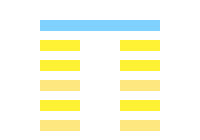
23.2.4.5 (23 > 6) - THE PO HEXAGRAM
- 2. The second line, divided, shows one overthrowing the couch by injuring its frame. (The injury will go on to) the destruction of (all) firm correctness, and there will be evil.
- 4. The fourth line, divided, shows its subject having overthrown the couch, and (going to injure) the skin (of him who lies on it). There will be evil.
- 5. The fifth line, divided, shows (its subject leading on the others like) a string of fishes, and (obtaining for them) the favour that lights on the inmates of the palace. There will be advantage in every way.
23.2.4.5 (23 > 6) - Not recognising legitimacy
One can tell others that they have lost their last supports.
Bing DeepL Google Yandex23.2.4.5 (23 > 6) - Not recognizing legitimacy
One can tell others that they have lost their last supports.
Bing DeepL Google Yandex23.2.4.5 (23 > 6) - Poh, l’écroulement
Poh : opprimer, renverser, traiter durement.
-
2. [i]Id. (Poh)[i], renverser son lit en en brisant la forme ; ruine, issue destructive. C’est celui qui se perd lui-même en perdant ses auxiliaires ; un roi, ses ministres ; un grand, ses employés et amis. (Dicton.)
Il n’aura pas de compagnons.
C’est la ruine s’étendant, gagnant le haut. -
4. Renverser son lit en s’écorchant, en se nuisant à soi-même, destruction certaine, calamité proche.
Suite de la gradation, en renversant on se blesse -
5. Le prince généreux envers les gens du palais (litt.(/i] : qui enfile des poissons pour en faire présent), en retirera des avantages certains.
Peut-être devrait-on admettre déjà ici l’élément figuratif et symbolique, et voir dans l’hexagramme la figure du prince (ligne pleine supérieure) au-dessus de ses officiers rangés comme des poissons séchés et traduire : avoir des officiers comme des poissons enfilés. Alors, il s’agirait de [i]p’o, gens du palais.
23.2.4.5 (23 > 6) - Ne pas reconnaître la légitimité
On peut dire aux autres qu'ils ont perdu leurs derniers soutiens.
Bing DeepL Google Yandex23.2.4.5 (23 > 6) - Lepusztulás
- 2. Támasz, amire nem lehet számítani többé.
- 4. Nem akar elviselni többé.
- 5. Látja mi nem működik.
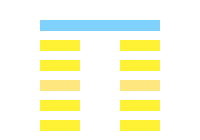
23.1.2.4.5 (23 > 10) - THE PO HEXAGRAM
- 1. The first line, divided, shows one overturning the couch by injuring its legs. (The injury will go on to) the destruction of (all) firm correctness, and there will be evil.
- 2. The second line, divided, shows one overthrowing the couch by injuring its frame. (The injury will go on to) the destruction of (all) firm correctness, and there will be evil.
- 4. The fourth line, divided, shows its subject having overthrown the couch, and (going to injure) the skin (of him who lies on it). There will be evil.
- 5. The fifth line, divided, shows (its subject leading on the others like) a string of fishes, and (obtaining for them) the favour that lights on the inmates of the palace. There will be advantage in every way.
23.1.2.4.5 (23 > 10) - Compensating
One provides support to those who have been inconvenienced.
Bing DeepL Google Yandex23.1.2.4.5 (23 > 10) - Compensating
One provides support to those who have been inconvenienced.
Bing DeepL Google Yandex23.1.2.4.5 (23 > 10) - Poh, l’écroulement
Poh : opprimer, renverser, traiter durement.
-
1. Poh, « renverser, faire crouler » son lit en en brisant un pied et le détachant ainsi (suites funestes).
C’est le grand, le prince qui se nuit à lui-même en appauvrissant, affaiblissant son peuple. -
2. [i]Id. (Poh)[i], renverser son lit en en brisant la forme ; ruine, issue destructive. C’est celui qui se perd lui-même en perdant ses auxiliaires ; un roi, ses ministres ; un grand, ses employés et amis. (Dicton.)
Il n’aura pas de compagnons.
C’est la ruine s’étendant, gagnant le haut. -
4. Renverser son lit en s’écorchant, en se nuisant à soi-même, destruction certaine, calamité proche.
Suite de la gradation, en renversant on se blesse -
5. Le prince généreux envers les gens du palais (litt.(/i] : qui enfile des poissons pour en faire présent), en retirera des avantages certains.
Peut-être devrait-on admettre déjà ici l’élément figuratif et symbolique, et voir dans l’hexagramme la figure du prince (ligne pleine supérieure) au-dessus de ses officiers rangés comme des poissons séchés et traduire : avoir des officiers comme des poissons enfilés. Alors, il s’agirait de [i]p’o, gens du palais.
23.1.2.4.5 (23 > 10) - Dédommager
On apporte son soutien à ceux qui ont été incommodés.
Bing DeepL Google Yandex23.1.2.4.5 (23 > 10) - Lepusztulás
- 1. Nem látja mit veszít.
- 2. Támasz, amire nem lehet számítani többé.
- 4. Nem akar elviselni többé.
- 5. Látja mi nem működik.

23.2.3.4.5 (23 > 44) - THE PO HEXAGRAM
- 2. The second line, divided, shows one overthrowing the couch by injuring its frame. (The injury will go on to) the destruction of (all) firm correctness, and there will be evil.
- 3. The third line, divided, shows its subject among the overthrowers; but there will be no error.
- 4. The fourth line, divided, shows its subject having overthrown the couch, and (going to injure) the skin (of him who lies on it). There will be evil.
- 5. The fifth line, divided, shows (its subject leading on the others like) a string of fishes, and (obtaining for them) the favour that lights on the inmates of the palace. There will be advantage in every way.
23.2.3.4.5 (23 > 44) - Taking the risk of being screwed
One assumes that the others are not that kind.
23.2.3.4.5 (23 > 44) - Taking the risk of being screwed
One assumes that the others are not that kind.
23.2.3.4.5 (23 > 44) - Poh, l’écroulement
Poh : opprimer, renverser, traiter durement.
-
2. [i]Id. (Poh)[i], renverser son lit en en brisant la forme ; ruine, issue destructive. C’est celui qui se perd lui-même en perdant ses auxiliaires ; un roi, ses ministres ; un grand, ses employés et amis. (Dicton.)
Il n’aura pas de compagnons.
C’est la ruine s’étendant, gagnant le haut. - 3. Renverser, faire crouler quelque chose sans suite regrettable. C’est quand on le fait légitimement et pour bonnes raisons. C’est que cela atteint également grands et petits (ou abandonne).
-
4. Renverser son lit en s’écorchant, en se nuisant à soi-même, destruction certaine, calamité proche.
Suite de la gradation, en renversant on se blesse -
5. Le prince généreux envers les gens du palais (litt.(/i] : qui enfile des poissons pour en faire présent), en retirera des avantages certains.
Peut-être devrait-on admettre déjà ici l’élément figuratif et symbolique, et voir dans l’hexagramme la figure du prince (ligne pleine supérieure) au-dessus de ses officiers rangés comme des poissons séchés et traduire : avoir des officiers comme des poissons enfilés. Alors, il s’agirait de [i]p’o, gens du palais.
23.2.3.4.5 (23 > 44) - Prendre le risque de se faire avoir
On présume que les autres ne sont pas de ce genre là.
Bing DeepL Google Yandex23.2.3.4.5 (23 > 44) - Lepusztulás
- 2. Támasz, amire nem lehet számítani többé.
- 3. Nem törődik a többiekkel többé.
- 4. Nem akar elviselni többé.
- 5. Látja mi nem működik.

23.1.2.3.4.5 (23 > 1) - THE PO HEXAGRAM
- 1. The first line, divided, shows one overturning the couch by injuring its legs. (The injury will go on to) the destruction of (all) firm correctness, and there will be evil.
- 2. The second line, divided, shows one overthrowing the couch by injuring its frame. (The injury will go on to) the destruction of (all) firm correctness, and there will be evil.
- 3. The third line, divided, shows its subject among the overthrowers; but there will be no error.
- 4. The fourth line, divided, shows its subject having overthrown the couch, and (going to injure) the skin (of him who lies on it). There will be evil.
- 5. The fifth line, divided, shows (its subject leading on the others like) a string of fishes, and (obtaining for them) the favour that lights on the inmates of the palace. There will be advantage in every way.
23.1.2.3.4.5 (23 > 1) - Poh, l’écroulement
Poh : opprimer, renverser, traiter durement.
-
1. Poh, « renverser, faire crouler » son lit en en brisant un pied et le détachant ainsi (suites funestes).
C’est le grand, le prince qui se nuit à lui-même en appauvrissant, affaiblissant son peuple. -
2. [i]Id. (Poh)[i], renverser son lit en en brisant la forme ; ruine, issue destructive. C’est celui qui se perd lui-même en perdant ses auxiliaires ; un roi, ses ministres ; un grand, ses employés et amis. (Dicton.)
Il n’aura pas de compagnons.
C’est la ruine s’étendant, gagnant le haut. - 3. Renverser, faire crouler quelque chose sans suite regrettable. C’est quand on le fait légitimement et pour bonnes raisons. C’est que cela atteint également grands et petits (ou abandonne).
-
4. Renverser son lit en s’écorchant, en se nuisant à soi-même, destruction certaine, calamité proche.
Suite de la gradation, en renversant on se blesse -
5. Le prince généreux envers les gens du palais (litt.(/i] : qui enfile des poissons pour en faire présent), en retirera des avantages certains.
Peut-être devrait-on admettre déjà ici l’élément figuratif et symbolique, et voir dans l’hexagramme la figure du prince (ligne pleine supérieure) au-dessus de ses officiers rangés comme des poissons séchés et traduire : avoir des officiers comme des poissons enfilés. Alors, il s’agirait de [i]p’o, gens du palais.
23.1.2.3.4.5 (23 > 1) - Ne pas lâcher prise
On fait des efforts pour continuer.
Bing DeepL Google Yandex23.1.2.3.4.5 (23 > 1) - Lepusztulás
- 1. Nem látja mit veszít.
- 2. Támasz, amire nem lehet számítani többé.
- 3. Nem törődik a többiekkel többé.
- 4. Nem akar elviselni többé.
- 5. Látja mi nem működik.
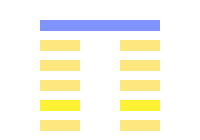
23.2.6 (23 > 7) - THE PO HEXAGRAM
- 2. The second line, divided, shows one overthrowing the couch by injuring its frame. (The injury will go on to) the destruction of (all) firm correctness, and there will be evil.
- 6. The topmost line, undivided, shows its subject (as) a great fruit which has not been eaten. The superior man finds (the people again) as a chariot carrying him. The small men (by their course) overthrow their own dwellings.
23.2.6 (23 > 7) - Not biting
One uses their reputation to avoid the challenge.
Bing DeepL Google Yandex23.2.6 (23 > 7) - Not biting
One uses their reputation to avoid the challenge.
Bing DeepL Google Yandex23.2.6 (23 > 7) - Poh, l’écroulement
Poh : opprimer, renverser, traiter durement.
-
2. [i]Id. (Poh)[i], renverser son lit en en brisant la forme ; ruine, issue destructive. C’est celui qui se perd lui-même en perdant ses auxiliaires ; un roi, ses ministres ; un grand, ses employés et amis. (Dicton.)
Il n’aura pas de compagnons.
C’est la ruine s’étendant, gagnant le haut. -
6. Fruit tout formé qu’on ne mange pas (bien acquis qui se détruit). Le sage, l’homme supérieur conquiert la terre (ou acquiert un char, le peuple qui le porte sur ses bras) ; l’homme bas et vulgaire fait crouler (poh) jusqu’à sa demeure (le fruit formé qu’il ne peut manger).
Il ne pourra plus en user.
23.2.6 (23 > 7) - Ne pas mordre à l'hameçon
On se sert de sa réputation pour ne pas avoir à relever le défi.
Bing DeepL Google Yandex23.2.6 (23 > 7) - Lepusztulás
- 2. Támasz, amire nem lehet számítani többé.
- 6. Elfogadja a veszteséget. Támogatást és lehetőséget kap.
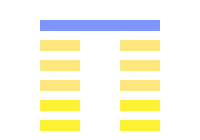
23.1.2.6 (23 > 19) - THE PO HEXAGRAM
- 1. The first line, divided, shows one overturning the couch by injuring its legs. (The injury will go on to) the destruction of (all) firm correctness, and there will be evil.
- 2. The second line, divided, shows one overthrowing the couch by injuring its frame. (The injury will go on to) the destruction of (all) firm correctness, and there will be evil.
- 6. The topmost line, undivided, shows its subject (as) a great fruit which has not been eaten. The superior man finds (the people again) as a chariot carrying him. The small men (by their course) overthrow their own dwellings.
23.1.2.6 (23 > 19) - Playing dead
One copies one's behaviour on that of less lively people.
Bing DeepL Google Yandex23.1.2.6 (23 > 19) - Playing dead
One copies one's behavior on that of less lively people.
Bing DeepL Google Yandex23.1.2.6 (23 > 19) - Poh, l’écroulement
Poh : opprimer, renverser, traiter durement.
-
1. Poh, « renverser, faire crouler » son lit en en brisant un pied et le détachant ainsi (suites funestes).
C’est le grand, le prince qui se nuit à lui-même en appauvrissant, affaiblissant son peuple. -
2. [i]Id. (Poh)[i], renverser son lit en en brisant la forme ; ruine, issue destructive. C’est celui qui se perd lui-même en perdant ses auxiliaires ; un roi, ses ministres ; un grand, ses employés et amis. (Dicton.)
Il n’aura pas de compagnons.
C’est la ruine s’étendant, gagnant le haut. -
6. Fruit tout formé qu’on ne mange pas (bien acquis qui se détruit). Le sage, l’homme supérieur conquiert la terre (ou acquiert un char, le peuple qui le porte sur ses bras) ; l’homme bas et vulgaire fait crouler (poh) jusqu’à sa demeure (le fruit formé qu’il ne peut manger).
Il ne pourra plus en user.
23.1.2.6 (23 > 19) - Faire le mort
On calque son comportement sur celui de personnes moins vivaces.
Bing DeepL Google Yandex23.1.2.6 (23 > 19) - Lepusztulás
- 1. Nem látja mit veszít.
- 2. Támasz, amire nem lehet számítani többé.
- 6. Elfogadja a veszteséget. Támogatást és lehetőséget kap.
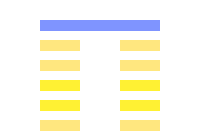
23.2.3.6 (23 > 46) - THE PO HEXAGRAM
- 2. The second line, divided, shows one overthrowing the couch by injuring its frame. (The injury will go on to) the destruction of (all) firm correctness, and there will be evil.
- 3. The third line, divided, shows its subject among the overthrowers; but there will be no error.
- 6. The topmost line, undivided, shows its subject (as) a great fruit which has not been eaten. The superior man finds (the people again) as a chariot carrying him. The small men (by their course) overthrow their own dwellings.
23.2.3.6 (23 > 46) - Aggravating one's situation
One does worse than the other times because they have not been condemned harshly enough.
Bing DeepL Google Yandex23.2.3.6 (23 > 46) - Aggravating one's situation
One does worse than the other times because they have not been condemned harshly enough.
Bing DeepL Google Yandex23.2.3.6 (23 > 46) - Poh, l’écroulement
Poh : opprimer, renverser, traiter durement.
-
2. [i]Id. (Poh)[i], renverser son lit en en brisant la forme ; ruine, issue destructive. C’est celui qui se perd lui-même en perdant ses auxiliaires ; un roi, ses ministres ; un grand, ses employés et amis. (Dicton.)
Il n’aura pas de compagnons.
C’est la ruine s’étendant, gagnant le haut. - 3. Renverser, faire crouler quelque chose sans suite regrettable. C’est quand on le fait légitimement et pour bonnes raisons. C’est que cela atteint également grands et petits (ou abandonne).
-
6. Fruit tout formé qu’on ne mange pas (bien acquis qui se détruit). Le sage, l’homme supérieur conquiert la terre (ou acquiert un char, le peuple qui le porte sur ses bras) ; l’homme bas et vulgaire fait crouler (poh) jusqu’à sa demeure (le fruit formé qu’il ne peut manger).
Il ne pourra plus en user.
23.2.3.6 (23 > 46) - Aggraver sa situation
On fait pire que les autres fois car on n'a pas été condamné assez sévèrement.
Bing DeepL Google Yandex23.2.3.6 (23 > 46) - Lepusztulás
- 2. Támasz, amire nem lehet számítani többé.
- 3. Nem törődik a többiekkel többé.
- 6. Elfogadja a veszteséget. Támogatást és lehetőséget kap.
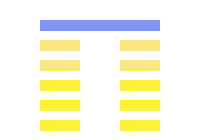
23.1.2.3.6 (23 > 11) - THE PO HEXAGRAM
- 1. The first line, divided, shows one overturning the couch by injuring its legs. (The injury will go on to) the destruction of (all) firm correctness, and there will be evil.
- 2. The second line, divided, shows one overthrowing the couch by injuring its frame. (The injury will go on to) the destruction of (all) firm correctness, and there will be evil.
- 3. The third line, divided, shows its subject among the overthrowers; but there will be no error.
- 6. The topmost line, undivided, shows its subject (as) a great fruit which has not been eaten. The superior man finds (the people again) as a chariot carrying him. The small men (by their course) overthrow their own dwellings.
23.1.2.3.6 (23 > 11) - Courting
One achieves one's goal by being courteous while remaining firm on one's values.
Bing DeepL Google Yandex23.1.2.3.6 (23 > 11) - Courting
One achieves one's goal by being courteous while remaining firm on one's values.
Bing DeepL Google Yandex23.1.2.3.6 (23 > 11) - Poh, l’écroulement
Poh : opprimer, renverser, traiter durement.
-
1. Poh, « renverser, faire crouler » son lit en en brisant un pied et le détachant ainsi (suites funestes).
C’est le grand, le prince qui se nuit à lui-même en appauvrissant, affaiblissant son peuple. -
2. [i]Id. (Poh)[i], renverser son lit en en brisant la forme ; ruine, issue destructive. C’est celui qui se perd lui-même en perdant ses auxiliaires ; un roi, ses ministres ; un grand, ses employés et amis. (Dicton.)
Il n’aura pas de compagnons.
C’est la ruine s’étendant, gagnant le haut. - 3. Renverser, faire crouler quelque chose sans suite regrettable. C’est quand on le fait légitimement et pour bonnes raisons. C’est que cela atteint également grands et petits (ou abandonne).
-
6. Fruit tout formé qu’on ne mange pas (bien acquis qui se détruit). Le sage, l’homme supérieur conquiert la terre (ou acquiert un char, le peuple qui le porte sur ses bras) ; l’homme bas et vulgaire fait crouler (poh) jusqu’à sa demeure (le fruit formé qu’il ne peut manger).
Il ne pourra plus en user.
23.1.2.3.6 (23 > 11) - Courtiser
On atteint son but en faisant preuve de courtoisie tout en restant ferme sur ses valeurs.
Bing DeepL Google Yandex23.1.2.3.6 (23 > 11) - Lepusztulás
- 1. Nem látja mit veszít.
- 2. Támasz, amire nem lehet számítani többé.
- 3. Nem törődik a többiekkel többé.
- 6. Elfogadja a veszteséget. Támogatást és lehetőséget kap.
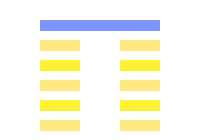
23.2.4.6 (23 > 40) - THE PO HEXAGRAM
- 2. The second line, divided, shows one overthrowing the couch by injuring its frame. (The injury will go on to) the destruction of (all) firm correctness, and there will be evil.
- 4. The fourth line, divided, shows its subject having overthrown the couch, and (going to injure) the skin (of him who lies on it). There will be evil.
- 6. The topmost line, undivided, shows its subject (as) a great fruit which has not been eaten. The superior man finds (the people again) as a chariot carrying him. The small men (by their course) overthrow their own dwellings.
23.2.4.6 (23 > 40) - Establishing a curfew
A measure aimed at restoring calm is welcomed.
Bing DeepL Google Yandex23.2.4.6 (23 > 40) - Establishing a curfew
A measure aimed at restoring calm is welcomed.
Bing DeepL Google Yandex23.2.4.6 (23 > 40) - Poh, l’écroulement
Poh : opprimer, renverser, traiter durement.
-
2. [i]Id. (Poh)[i], renverser son lit en en brisant la forme ; ruine, issue destructive. C’est celui qui se perd lui-même en perdant ses auxiliaires ; un roi, ses ministres ; un grand, ses employés et amis. (Dicton.)
Il n’aura pas de compagnons.
C’est la ruine s’étendant, gagnant le haut. -
4. Renverser son lit en s’écorchant, en se nuisant à soi-même, destruction certaine, calamité proche.
Suite de la gradation, en renversant on se blesse -
6. Fruit tout formé qu’on ne mange pas (bien acquis qui se détruit). Le sage, l’homme supérieur conquiert la terre (ou acquiert un char, le peuple qui le porte sur ses bras) ; l’homme bas et vulgaire fait crouler (poh) jusqu’à sa demeure (le fruit formé qu’il ne peut manger).
Il ne pourra plus en user.
23.2.4.6 (23 > 40) - Instaurer un couvre-feu
On plébiscite une mesure destinée à ramener le calme.
Bing DeepL Google Yandex23.2.4.6 (23 > 40) - Lepusztulás
- 2. Támasz, amire nem lehet számítani többé.
- 4. Nem akar elviselni többé.
- 6. Elfogadja a veszteséget. Támogatást és lehetőséget kap.
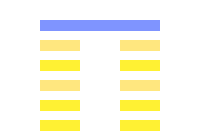
23.1.2.4.6 (23 > 54) - THE PO HEXAGRAM
- 1. The first line, divided, shows one overturning the couch by injuring its legs. (The injury will go on to) the destruction of (all) firm correctness, and there will be evil.
- 2. The second line, divided, shows one overthrowing the couch by injuring its frame. (The injury will go on to) the destruction of (all) firm correctness, and there will be evil.
- 4. The fourth line, divided, shows its subject having overthrown the couch, and (going to injure) the skin (of him who lies on it). There will be evil.
- 6. The topmost line, undivided, shows its subject (as) a great fruit which has not been eaten. The superior man finds (the people again) as a chariot carrying him. The small men (by their course) overthrow their own dwellings.
23.1.2.4.6 (23 > 54) - Pulling oneself together
One jokes about one's own decline when one should be looking for ways to remedy it.
Bing DeepL Google Yandex23.1.2.4.6 (23 > 54) - Pulling oneself together
One jokes about one's own decline when one should be looking for ways to remedy it.
Bing DeepL Google Yandex23.1.2.4.6 (23 > 54) - Poh, l’écroulement
Poh : opprimer, renverser, traiter durement.
-
1. Poh, « renverser, faire crouler » son lit en en brisant un pied et le détachant ainsi (suites funestes).
C’est le grand, le prince qui se nuit à lui-même en appauvrissant, affaiblissant son peuple. -
2. [i]Id. (Poh)[i], renverser son lit en en brisant la forme ; ruine, issue destructive. C’est celui qui se perd lui-même en perdant ses auxiliaires ; un roi, ses ministres ; un grand, ses employés et amis. (Dicton.)
Il n’aura pas de compagnons.
C’est la ruine s’étendant, gagnant le haut. -
4. Renverser son lit en s’écorchant, en se nuisant à soi-même, destruction certaine, calamité proche.
Suite de la gradation, en renversant on se blesse -
6. Fruit tout formé qu’on ne mange pas (bien acquis qui se détruit). Le sage, l’homme supérieur conquiert la terre (ou acquiert un char, le peuple qui le porte sur ses bras) ; l’homme bas et vulgaire fait crouler (poh) jusqu’à sa demeure (le fruit formé qu’il ne peut manger).
Il ne pourra plus en user.
23.1.2.4.6 (23 > 54) - Se ressaisir
On plaisante sur sa propre déchéance alors qu'on devrait chercher les moyens d'y remédier.
Bing DeepL Google Yandex23.1.2.4.6 (23 > 54) - Lepusztulás
- 1. Nem látja mit veszít.
- 2. Támasz, amire nem lehet számítani többé.
- 4. Nem akar elviselni többé.
- 6. Elfogadja a veszteséget. Támogatást és lehetőséget kap.
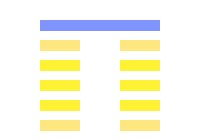
23.2.3.4.6 (23 > 32) - THE PO HEXAGRAM
- 2. The second line, divided, shows one overthrowing the couch by injuring its frame. (The injury will go on to) the destruction of (all) firm correctness, and there will be evil.
- 3. The third line, divided, shows its subject among the overthrowers; but there will be no error.
- 4. The fourth line, divided, shows its subject having overthrown the couch, and (going to injure) the skin (of him who lies on it). There will be evil.
- 6. The topmost line, undivided, shows its subject (as) a great fruit which has not been eaten. The superior man finds (the people again) as a chariot carrying him. The small men (by their course) overthrow their own dwellings.
23.2.3.4.6 (23 > 32) - Continuing without a coach
One would be wrong to believe that others could succeed without practice.
Bing DeepL Google Yandex23.2.3.4.6 (23 > 32) - Continuing without a coach
One would be wrong to believe that others could succeed without practice.
Bing DeepL Google Yandex23.2.3.4.6 (23 > 32) - Poh, l’écroulement
Poh : opprimer, renverser, traiter durement.
-
2. [i]Id. (Poh)[i], renverser son lit en en brisant la forme ; ruine, issue destructive. C’est celui qui se perd lui-même en perdant ses auxiliaires ; un roi, ses ministres ; un grand, ses employés et amis. (Dicton.)
Il n’aura pas de compagnons.
C’est la ruine s’étendant, gagnant le haut. - 3. Renverser, faire crouler quelque chose sans suite regrettable. C’est quand on le fait légitimement et pour bonnes raisons. C’est que cela atteint également grands et petits (ou abandonne).
-
4. Renverser son lit en s’écorchant, en se nuisant à soi-même, destruction certaine, calamité proche.
Suite de la gradation, en renversant on se blesse -
6. Fruit tout formé qu’on ne mange pas (bien acquis qui se détruit). Le sage, l’homme supérieur conquiert la terre (ou acquiert un char, le peuple qui le porte sur ses bras) ; l’homme bas et vulgaire fait crouler (poh) jusqu’à sa demeure (le fruit formé qu’il ne peut manger).
Il ne pourra plus en user.
23.2.3.4.6 (23 > 32) - Continuer sans entraîneur
On aurait tort de croire que les autres ont pu réussir sans entraînement.
Bing DeepL Google Yandex23.2.3.4.6 (23 > 32) - Lepusztulás
- 2. Támasz, amire nem lehet számítani többé.
- 3. Nem törődik a többiekkel többé.
- 4. Nem akar elviselni többé.
- 6. Elfogadja a veszteséget. Támogatást és lehetőséget kap.
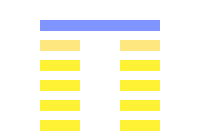
23.1.2.3.4.6 (23 > 34) - THE PO HEXAGRAM
- 1. The first line, divided, shows one overturning the couch by injuring its legs. (The injury will go on to) the destruction of (all) firm correctness, and there will be evil.
- 2. The second line, divided, shows one overthrowing the couch by injuring its frame. (The injury will go on to) the destruction of (all) firm correctness, and there will be evil.
- 3. The third line, divided, shows its subject among the overthrowers; but there will be no error.
- 4. The fourth line, divided, shows its subject having overthrown the couch, and (going to injure) the skin (of him who lies on it). There will be evil.
- 6. The topmost line, undivided, shows its subject (as) a great fruit which has not been eaten. The superior man finds (the people again) as a chariot carrying him. The small men (by their course) overthrow their own dwellings.
23.1.2.3.4.6 (23 > 34) - Sterilising the debate
One specifically complicates things as much so that nobody can find their way around.
Bing DeepL Google Yandex23.1.2.3.4.6 (23 > 34) - Sterilizing the debate
One specifically complicates things as much so that nobody can find their way around.
Bing DeepL Google Yandex23.1.2.3.4.6 (23 > 34) - Poh, l’écroulement
Poh : opprimer, renverser, traiter durement.
-
1. Poh, « renverser, faire crouler » son lit en en brisant un pied et le détachant ainsi (suites funestes).
C’est le grand, le prince qui se nuit à lui-même en appauvrissant, affaiblissant son peuple. -
2. [i]Id. (Poh)[i], renverser son lit en en brisant la forme ; ruine, issue destructive. C’est celui qui se perd lui-même en perdant ses auxiliaires ; un roi, ses ministres ; un grand, ses employés et amis. (Dicton.)
Il n’aura pas de compagnons.
C’est la ruine s’étendant, gagnant le haut. - 3. Renverser, faire crouler quelque chose sans suite regrettable. C’est quand on le fait légitimement et pour bonnes raisons. C’est que cela atteint également grands et petits (ou abandonne).
-
4. Renverser son lit en s’écorchant, en se nuisant à soi-même, destruction certaine, calamité proche.
Suite de la gradation, en renversant on se blesse -
6. Fruit tout formé qu’on ne mange pas (bien acquis qui se détruit). Le sage, l’homme supérieur conquiert la terre (ou acquiert un char, le peuple qui le porte sur ses bras) ; l’homme bas et vulgaire fait crouler (poh) jusqu’à sa demeure (le fruit formé qu’il ne peut manger).
Il ne pourra plus en user.
23.1.2.3.4.6 (23 > 34) - Stériliser le débat
On complique les choses à souhait pour que personne ne s'y retrouve.
Bing DeepL Google Yandex23.1.2.3.4.6 (23 > 34) - Lepusztulás
- 1. Nem látja mit veszít.
- 2. Támasz, amire nem lehet számítani többé.
- 3. Nem törődik a többiekkel többé.
- 4. Nem akar elviselni többé.
- 6. Elfogadja a veszteséget. Támogatást és lehetőséget kap.
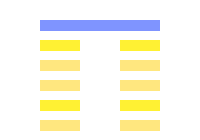
23.2.5.6 (23 > 29) - THE PO HEXAGRAM
- 2. The second line, divided, shows one overthrowing the couch by injuring its frame. (The injury will go on to) the destruction of (all) firm correctness, and there will be evil.
- 5. The fifth line, divided, shows (its subject leading on the others like) a string of fishes, and (obtaining for them) the favour that lights on the inmates of the palace. There will be advantage in every way.
- 6. The topmost line, undivided, shows its subject (as) a great fruit which has not been eaten. The superior man finds (the people again) as a chariot carrying him. The small men (by their course) overthrow their own dwellings.
23.2.5.6 (23 > 29) - Preventing risks
One sets up a procedure so that others are able to pay attention to the smallest details.
Bing DeepL Google Yandex23.2.5.6 (23 > 29) - Preventing risks
One sets up a procedure so that others are able to pay attention to the smallest details.
Bing DeepL Google Yandex23.2.5.6 (23 > 29) - Poh, l’écroulement
Poh : opprimer, renverser, traiter durement.
-
2. [i]Id. (Poh)[i], renverser son lit en en brisant la forme ; ruine, issue destructive. C’est celui qui se perd lui-même en perdant ses auxiliaires ; un roi, ses ministres ; un grand, ses employés et amis. (Dicton.)
Il n’aura pas de compagnons.
C’est la ruine s’étendant, gagnant le haut. -
5. Le prince généreux envers les gens du palais (litt.(/i] : qui enfile des poissons pour en faire présent), en retirera des avantages certains.
Peut-être devrait-on admettre déjà ici l’élément figuratif et symbolique, et voir dans l’hexagramme la figure du prince (ligne pleine supérieure) au-dessus de ses officiers rangés comme des poissons séchés et traduire : avoir des officiers comme des poissons enfilés. Alors, il s’agirait de [i]p’o, gens du palais. -
6. Fruit tout formé qu’on ne mange pas (bien acquis qui se détruit). Le sage, l’homme supérieur conquiert la terre (ou acquiert un char, le peuple qui le porte sur ses bras) ; l’homme bas et vulgaire fait crouler (poh) jusqu’à sa demeure (le fruit formé qu’il ne peut manger).
Il ne pourra plus en user.
23.2.5.6 (23 > 29) - Prévenir les risques
On met en place une procédure pour que les autres soient en mesure de faire attention aux moindres détails.
Bing DeepL Google Yandex23.2.5.6 (23 > 29) - Lepusztulás
- 2. Támasz, amire nem lehet számítani többé.
- 5. Látja mi nem működik.
- 6. Elfogadja a veszteséget. Támogatást és lehetőséget kap.
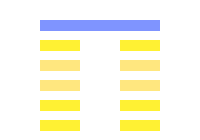
23.1.2.5.6 (23 > 60) - THE PO HEXAGRAM
- 1. The first line, divided, shows one overturning the couch by injuring its legs. (The injury will go on to) the destruction of (all) firm correctness, and there will be evil.
- 2. The second line, divided, shows one overthrowing the couch by injuring its frame. (The injury will go on to) the destruction of (all) firm correctness, and there will be evil.
- 5. The fifth line, divided, shows (its subject leading on the others like) a string of fishes, and (obtaining for them) the favour that lights on the inmates of the palace. There will be advantage in every way.
- 6. The topmost line, undivided, shows its subject (as) a great fruit which has not been eaten. The superior man finds (the people again) as a chariot carrying him. The small men (by their course) overthrow their own dwellings.
23.1.2.5.6 (23 > 60) - Clouding the issue
One creates a misunderstanding so one doesn't have to explain oneself.
Bing DeepL Google Yandex23.1.2.5.6 (23 > 60) - Clouding the issue
One creates a misunderstanding so one doesn't have to explain oneself.
Bing DeepL Google Yandex23.1.2.5.6 (23 > 60) - Poh, l’écroulement
Poh : opprimer, renverser, traiter durement.
-
1. Poh, « renverser, faire crouler » son lit en en brisant un pied et le détachant ainsi (suites funestes).
C’est le grand, le prince qui se nuit à lui-même en appauvrissant, affaiblissant son peuple. -
2. [i]Id. (Poh)[i], renverser son lit en en brisant la forme ; ruine, issue destructive. C’est celui qui se perd lui-même en perdant ses auxiliaires ; un roi, ses ministres ; un grand, ses employés et amis. (Dicton.)
Il n’aura pas de compagnons.
C’est la ruine s’étendant, gagnant le haut. -
5. Le prince généreux envers les gens du palais (litt.(/i] : qui enfile des poissons pour en faire présent), en retirera des avantages certains.
Peut-être devrait-on admettre déjà ici l’élément figuratif et symbolique, et voir dans l’hexagramme la figure du prince (ligne pleine supérieure) au-dessus de ses officiers rangés comme des poissons séchés et traduire : avoir des officiers comme des poissons enfilés. Alors, il s’agirait de [i]p’o, gens du palais. -
6. Fruit tout formé qu’on ne mange pas (bien acquis qui se détruit). Le sage, l’homme supérieur conquiert la terre (ou acquiert un char, le peuple qui le porte sur ses bras) ; l’homme bas et vulgaire fait crouler (poh) jusqu’à sa demeure (le fruit formé qu’il ne peut manger).
Il ne pourra plus en user.
23.1.2.5.6 (23 > 60) - Brouiller les pistes
On crée un malentendu pour ne pas avoir à s'expliquer.
Bing DeepL Google Yandex23.1.2.5.6 (23 > 60) - Lepusztulás
- 1. Nem látja mit veszít.
- 2. Támasz, amire nem lehet számítani többé.
- 5. Látja mi nem működik.
- 6. Elfogadja a veszteséget. Támogatást és lehetőséget kap.
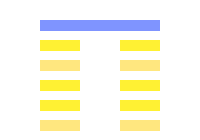
23.2.3.5.6 (23 > 48) - THE PO HEXAGRAM
- 2. The second line, divided, shows one overthrowing the couch by injuring its frame. (The injury will go on to) the destruction of (all) firm correctness, and there will be evil.
- 3. The third line, divided, shows its subject among the overthrowers; but there will be no error.
- 5. The fifth line, divided, shows (its subject leading on the others like) a string of fishes, and (obtaining for them) the favour that lights on the inmates of the palace. There will be advantage in every way.
- 6. The topmost line, undivided, shows its subject (as) a great fruit which has not been eaten. The superior man finds (the people again) as a chariot carrying him. The small men (by their course) overthrow their own dwellings.
23.2.3.5.6 (23 > 48) - Escaping from resentment
One flees rather than listen to a speech full of acrimony.
Bing DeepL Google Yandex23.2.3.5.6 (23 > 48) - Escaping from resentment
One flees rather than listen to a speech full of acrimony.
Bing DeepL Google Yandex23.2.3.5.6 (23 > 48) - Poh, l’écroulement
Poh : opprimer, renverser, traiter durement.
-
2. [i]Id. (Poh)[i], renverser son lit en en brisant la forme ; ruine, issue destructive. C’est celui qui se perd lui-même en perdant ses auxiliaires ; un roi, ses ministres ; un grand, ses employés et amis. (Dicton.)
Il n’aura pas de compagnons.
C’est la ruine s’étendant, gagnant le haut. - 3. Renverser, faire crouler quelque chose sans suite regrettable. C’est quand on le fait légitimement et pour bonnes raisons. C’est que cela atteint également grands et petits (ou abandonne).
-
5. Le prince généreux envers les gens du palais (litt.(/i] : qui enfile des poissons pour en faire présent), en retirera des avantages certains.
Peut-être devrait-on admettre déjà ici l’élément figuratif et symbolique, et voir dans l’hexagramme la figure du prince (ligne pleine supérieure) au-dessus de ses officiers rangés comme des poissons séchés et traduire : avoir des officiers comme des poissons enfilés. Alors, il s’agirait de [i]p’o, gens du palais. -
6. Fruit tout formé qu’on ne mange pas (bien acquis qui se détruit). Le sage, l’homme supérieur conquiert la terre (ou acquiert un char, le peuple qui le porte sur ses bras) ; l’homme bas et vulgaire fait crouler (poh) jusqu’à sa demeure (le fruit formé qu’il ne peut manger).
Il ne pourra plus en user.
23.2.3.5.6 (23 > 48) - S'évader de la rancœur
On fuit plutôt que d'écouter un discours plein d'acrimonie.
Bing DeepL Google Yandex23.2.3.5.6 (23 > 48) - Lepusztulás
- 2. Támasz, amire nem lehet számítani többé.
- 3. Nem törődik a többiekkel többé.
- 5. Látja mi nem működik.
- 6. Elfogadja a veszteséget. Támogatást és lehetőséget kap.
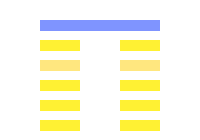
23.1.2.3.5.6 (23 > 5) - THE PO HEXAGRAM
- 1. The first line, divided, shows one overturning the couch by injuring its legs. (The injury will go on to) the destruction of (all) firm correctness, and there will be evil.
- 2. The second line, divided, shows one overthrowing the couch by injuring its frame. (The injury will go on to) the destruction of (all) firm correctness, and there will be evil.
- 3. The third line, divided, shows its subject among the overthrowers; but there will be no error.
- 5. The fifth line, divided, shows (its subject leading on the others like) a string of fishes, and (obtaining for them) the favour that lights on the inmates of the palace. There will be advantage in every way.
- 6. The topmost line, undivided, shows its subject (as) a great fruit which has not been eaten. The superior man finds (the people again) as a chariot carrying him. The small men (by their course) overthrow their own dwellings.
23.1.2.3.5.6 (23 > 5) - Imposing one's views
One presents their conclusions to those who have no other choice than accepting them.
Bing DeepL Google Yandex23.1.2.3.5.6 (23 > 5) - Imposing one's views
One presents their conclusions to those who have no other choice than accepting them.
Bing DeepL Google Yandex23.1.2.3.5.6 (23 > 5) - Poh, l’écroulement
Poh : opprimer, renverser, traiter durement.
-
1. Poh, « renverser, faire crouler » son lit en en brisant un pied et le détachant ainsi (suites funestes).
C’est le grand, le prince qui se nuit à lui-même en appauvrissant, affaiblissant son peuple. -
2. [i]Id. (Poh)[i], renverser son lit en en brisant la forme ; ruine, issue destructive. C’est celui qui se perd lui-même en perdant ses auxiliaires ; un roi, ses ministres ; un grand, ses employés et amis. (Dicton.)
Il n’aura pas de compagnons.
C’est la ruine s’étendant, gagnant le haut. - 3. Renverser, faire crouler quelque chose sans suite regrettable. C’est quand on le fait légitimement et pour bonnes raisons. C’est que cela atteint également grands et petits (ou abandonne).
-
5. Le prince généreux envers les gens du palais (litt.(/i] : qui enfile des poissons pour en faire présent), en retirera des avantages certains.
Peut-être devrait-on admettre déjà ici l’élément figuratif et symbolique, et voir dans l’hexagramme la figure du prince (ligne pleine supérieure) au-dessus de ses officiers rangés comme des poissons séchés et traduire : avoir des officiers comme des poissons enfilés. Alors, il s’agirait de [i]p’o, gens du palais. -
6. Fruit tout formé qu’on ne mange pas (bien acquis qui se détruit). Le sage, l’homme supérieur conquiert la terre (ou acquiert un char, le peuple qui le porte sur ses bras) ; l’homme bas et vulgaire fait crouler (poh) jusqu’à sa demeure (le fruit formé qu’il ne peut manger).
Il ne pourra plus en user.
23.1.2.3.5.6 (23 > 5) - Imposer ses vues
On présente ses conclusions à ceux qui n'ont pas d'autre choix que de les accepter.
Bing DeepL Google Yandex23.1.2.3.5.6 (23 > 5) - Lepusztulás
- 1. Nem látja mit veszít.
- 2. Támasz, amire nem lehet számítani többé.
- 3. Nem törődik a többiekkel többé.
- 5. Látja mi nem működik.
- 6. Elfogadja a veszteséget. Támogatást és lehetőséget kap.
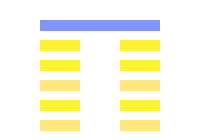
23.2.4.5.6 (23 > 47) - THE PO HEXAGRAM
- 2. The second line, divided, shows one overthrowing the couch by injuring its frame. (The injury will go on to) the destruction of (all) firm correctness, and there will be evil.
- 4. The fourth line, divided, shows its subject having overthrown the couch, and (going to injure) the skin (of him who lies on it). There will be evil.
- 5. The fifth line, divided, shows (its subject leading on the others like) a string of fishes, and (obtaining for them) the favour that lights on the inmates of the palace. There will be advantage in every way.
- 6. The topmost line, undivided, shows its subject (as) a great fruit which has not been eaten. The superior man finds (the people again) as a chariot carrying him. The small men (by their course) overthrow their own dwellings.
23.2.4.5.6 (23 > 47) - Avoiding cramming
One revises one's lessons without taking care of the subject that will be proposed.
Bing DeepL Google Yandex23.2.4.5.6 (23 > 47) - Avoiding cramming
One revises one's lessons without taking care of the subject that will be proposed.
Bing DeepL Google Yandex23.2.4.5.6 (23 > 47) - Poh, l’écroulement
Poh : opprimer, renverser, traiter durement.
-
2. [i]Id. (Poh)[i], renverser son lit en en brisant la forme ; ruine, issue destructive. C’est celui qui se perd lui-même en perdant ses auxiliaires ; un roi, ses ministres ; un grand, ses employés et amis. (Dicton.)
Il n’aura pas de compagnons.
C’est la ruine s’étendant, gagnant le haut. -
4. Renverser son lit en s’écorchant, en se nuisant à soi-même, destruction certaine, calamité proche.
Suite de la gradation, en renversant on se blesse -
5. Le prince généreux envers les gens du palais (litt.(/i] : qui enfile des poissons pour en faire présent), en retirera des avantages certains.
Peut-être devrait-on admettre déjà ici l’élément figuratif et symbolique, et voir dans l’hexagramme la figure du prince (ligne pleine supérieure) au-dessus de ses officiers rangés comme des poissons séchés et traduire : avoir des officiers comme des poissons enfilés. Alors, il s’agirait de [i]p’o, gens du palais. -
6. Fruit tout formé qu’on ne mange pas (bien acquis qui se détruit). Le sage, l’homme supérieur conquiert la terre (ou acquiert un char, le peuple qui le porte sur ses bras) ; l’homme bas et vulgaire fait crouler (poh) jusqu’à sa demeure (le fruit formé qu’il ne peut manger).
Il ne pourra plus en user.
23.2.4.5.6 (23 > 47) - Éviter le bachotage
On révise ses leçons sans prendre garde au sujet qui sera proposé.
Bing DeepL Google Yandex23.2.4.5.6 (23 > 47) - Lepusztulás
- 2. Támasz, amire nem lehet számítani többé.
- 4. Nem akar elviselni többé.
- 5. Látja mi nem működik.
- 6. Elfogadja a veszteséget. Támogatást és lehetőséget kap.
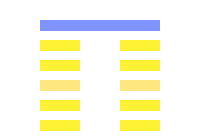
23.1.2.4.5.6 (23 > 58) - THE PO HEXAGRAM
- 1. The first line, divided, shows one overturning the couch by injuring its legs. (The injury will go on to) the destruction of (all) firm correctness, and there will be evil.
- 2. The second line, divided, shows one overthrowing the couch by injuring its frame. (The injury will go on to) the destruction of (all) firm correctness, and there will be evil.
- 4. The fourth line, divided, shows its subject having overthrown the couch, and (going to injure) the skin (of him who lies on it). There will be evil.
- 5. The fifth line, divided, shows (its subject leading on the others like) a string of fishes, and (obtaining for them) the favour that lights on the inmates of the palace. There will be advantage in every way.
- 6. The topmost line, undivided, shows its subject (as) a great fruit which has not been eaten. The superior man finds (the people again) as a chariot carrying him. The small men (by their course) overthrow their own dwellings.
23.1.2.4.5.6 (23 > 58) - Not giving in to leniency
One applies the law in all its severity to avoid being accused of being lax.
Bing DeepL Google Yandex23.1.2.4.5.6 (23 > 58) - Not giving in to leniency
One applies the law in all its severity to avoid being accused of being lax.
Bing DeepL Google Yandex23.1.2.4.5.6 (23 > 58) - Poh, l’écroulement
Poh : opprimer, renverser, traiter durement.
-
1. Poh, « renverser, faire crouler » son lit en en brisant un pied et le détachant ainsi (suites funestes).
C’est le grand, le prince qui se nuit à lui-même en appauvrissant, affaiblissant son peuple. -
2. [i]Id. (Poh)[i], renverser son lit en en brisant la forme ; ruine, issue destructive. C’est celui qui se perd lui-même en perdant ses auxiliaires ; un roi, ses ministres ; un grand, ses employés et amis. (Dicton.)
Il n’aura pas de compagnons.
C’est la ruine s’étendant, gagnant le haut. -
4. Renverser son lit en s’écorchant, en se nuisant à soi-même, destruction certaine, calamité proche.
Suite de la gradation, en renversant on se blesse -
5. Le prince généreux envers les gens du palais (litt.(/i] : qui enfile des poissons pour en faire présent), en retirera des avantages certains.
Peut-être devrait-on admettre déjà ici l’élément figuratif et symbolique, et voir dans l’hexagramme la figure du prince (ligne pleine supérieure) au-dessus de ses officiers rangés comme des poissons séchés et traduire : avoir des officiers comme des poissons enfilés. Alors, il s’agirait de [i]p’o, gens du palais. -
6. Fruit tout formé qu’on ne mange pas (bien acquis qui se détruit). Le sage, l’homme supérieur conquiert la terre (ou acquiert un char, le peuple qui le porte sur ses bras) ; l’homme bas et vulgaire fait crouler (poh) jusqu’à sa demeure (le fruit formé qu’il ne peut manger).
Il ne pourra plus en user.
23.1.2.4.5.6 (23 > 58) - Ne pas céder à l'indulgence
On applique la loi dans toute sa sévérité pour ne pas être accusé de laxisme.
Bing DeepL Google Yandex23.1.2.4.5.6 (23 > 58) - Lepusztulás
- 1. Nem látja mit veszít.
- 2. Támasz, amire nem lehet számítani többé.
- 4. Nem akar elviselni többé.
- 5. Látja mi nem működik.
- 6. Elfogadja a veszteséget. Támogatást és lehetőséget kap.
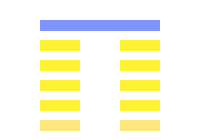
23.2.3.4.5.6 (23 > 28) - THE PO HEXAGRAM
- 2. The second line, divided, shows one overthrowing the couch by injuring its frame. (The injury will go on to) the destruction of (all) firm correctness, and there will be evil.
- 3. The third line, divided, shows its subject among the overthrowers; but there will be no error.
- 4. The fourth line, divided, shows its subject having overthrown the couch, and (going to injure) the skin (of him who lies on it). There will be evil.
- 5. The fifth line, divided, shows (its subject leading on the others like) a string of fishes, and (obtaining for them) the favour that lights on the inmates of the palace. There will be advantage in every way.
- 6. The topmost line, undivided, shows its subject (as) a great fruit which has not been eaten. The superior man finds (the people again) as a chariot carrying him. The small men (by their course) overthrow their own dwellings.
23.2.3.4.5.6 (23 > 28) - Faking benevolence
One likes to make others believe that they will have no trouble making themselves heard.
Bing DeepL Google Yandex23.2.3.4.5.6 (23 > 28) - Faking benevolence
One likes to make others believe that they will have no trouble making themselves heard.
Bing DeepL Google Yandex23.2.3.4.5.6 (23 > 28) - Poh, l’écroulement
Poh : opprimer, renverser, traiter durement.
-
2. [i]Id. (Poh)[i], renverser son lit en en brisant la forme ; ruine, issue destructive. C’est celui qui se perd lui-même en perdant ses auxiliaires ; un roi, ses ministres ; un grand, ses employés et amis. (Dicton.)
Il n’aura pas de compagnons.
C’est la ruine s’étendant, gagnant le haut. - 3. Renverser, faire crouler quelque chose sans suite regrettable. C’est quand on le fait légitimement et pour bonnes raisons. C’est que cela atteint également grands et petits (ou abandonne).
-
4. Renverser son lit en s’écorchant, en se nuisant à soi-même, destruction certaine, calamité proche.
Suite de la gradation, en renversant on se blesse -
5. Le prince généreux envers les gens du palais (litt.(/i] : qui enfile des poissons pour en faire présent), en retirera des avantages certains.
Peut-être devrait-on admettre déjà ici l’élément figuratif et symbolique, et voir dans l’hexagramme la figure du prince (ligne pleine supérieure) au-dessus de ses officiers rangés comme des poissons séchés et traduire : avoir des officiers comme des poissons enfilés. Alors, il s’agirait de [i]p’o, gens du palais. -
6. Fruit tout formé qu’on ne mange pas (bien acquis qui se détruit). Le sage, l’homme supérieur conquiert la terre (ou acquiert un char, le peuple qui le porte sur ses bras) ; l’homme bas et vulgaire fait crouler (poh) jusqu’à sa demeure (le fruit formé qu’il ne peut manger).
Il ne pourra plus en user.
23.2.3.4.5.6 (23 > 28) - Feindre la bienveillance
On se plaît à faire croire aux autres qu'ils n'auront aucun mal à se faire entendre.
Bing DeepL Google Yandex23.2.3.4.5.6 (23 > 28) - Lepusztulás
- 2. Támasz, amire nem lehet számítani többé.
- 3. Nem törődik a többiekkel többé.
- 4. Nem akar elviselni többé.
- 5. Látja mi nem működik.
- 6. Elfogadja a veszteséget. Támogatást és lehetőséget kap.
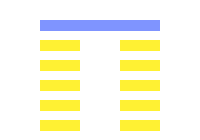
23.1.2.3.4.5.6 (23 > 43) - THE PO HEXAGRAM
- 1. The first line, divided, shows one overturning the couch by injuring its legs. (The injury will go on to) the destruction of (all) firm correctness, and there will be evil.
- 2. The second line, divided, shows one overthrowing the couch by injuring its frame. (The injury will go on to) the destruction of (all) firm correctness, and there will be evil.
- 3. The third line, divided, shows its subject among the overthrowers; but there will be no error.
- 4. The fourth line, divided, shows its subject having overthrown the couch, and (going to injure) the skin (of him who lies on it). There will be evil.
- 5. The fifth line, divided, shows (its subject leading on the others like) a string of fishes, and (obtaining for them) the favour that lights on the inmates of the palace. There will be advantage in every way.
- 6. The topmost line, undivided, shows its subject (as) a great fruit which has not been eaten. The superior man finds (the people again) as a chariot carrying him. The small men (by their course) overthrow their own dwellings.
23.1.2.3.4.5.6 (23 > 43) - Terrorizing one's subjects
One represses those who seek justice.
Bing DeepL Google Yandex23.1.2.3.4.5.6 (23 > 43) - Terrorizing one's subjects
One represses those who seek justice.
Bing DeepL Google Yandex23.1.2.3.4.5.6 (23 > 43) - Poh, l’écroulement
Poh : opprimer, renverser, traiter durement.
-
1. Poh, « renverser, faire crouler » son lit en en brisant un pied et le détachant ainsi (suites funestes).
C’est le grand, le prince qui se nuit à lui-même en appauvrissant, affaiblissant son peuple. -
2. [i]Id. (Poh)[i], renverser son lit en en brisant la forme ; ruine, issue destructive. C’est celui qui se perd lui-même en perdant ses auxiliaires ; un roi, ses ministres ; un grand, ses employés et amis. (Dicton.)
Il n’aura pas de compagnons.
C’est la ruine s’étendant, gagnant le haut. - 3. Renverser, faire crouler quelque chose sans suite regrettable. C’est quand on le fait légitimement et pour bonnes raisons. C’est que cela atteint également grands et petits (ou abandonne).
-
4. Renverser son lit en s’écorchant, en se nuisant à soi-même, destruction certaine, calamité proche.
Suite de la gradation, en renversant on se blesse -
5. Le prince généreux envers les gens du palais (litt.(/i] : qui enfile des poissons pour en faire présent), en retirera des avantages certains.
Peut-être devrait-on admettre déjà ici l’élément figuratif et symbolique, et voir dans l’hexagramme la figure du prince (ligne pleine supérieure) au-dessus de ses officiers rangés comme des poissons séchés et traduire : avoir des officiers comme des poissons enfilés. Alors, il s’agirait de [i]p’o, gens du palais. -
6. Fruit tout formé qu’on ne mange pas (bien acquis qui se détruit). Le sage, l’homme supérieur conquiert la terre (ou acquiert un char, le peuple qui le porte sur ses bras) ; l’homme bas et vulgaire fait crouler (poh) jusqu’à sa demeure (le fruit formé qu’il ne peut manger).
Il ne pourra plus en user.
23.1.2.3.4.5.6 (23 > 43) - Terroriser ses sujets
On réprime ceux qui demandent justice.
Bing DeepL Google Yandex23.1.2.3.4.5.6 (23 > 43) - Lepusztulás
- 1. Nem látja mit veszít.
- 2. Támasz, amire nem lehet számítani többé.
- 3. Nem törődik a többiekkel többé.
- 4. Nem akar elviselni többé.
- 5. Látja mi nem működik.
- 6. Elfogadja a veszteséget. Támogatást és lehetőséget kap.

